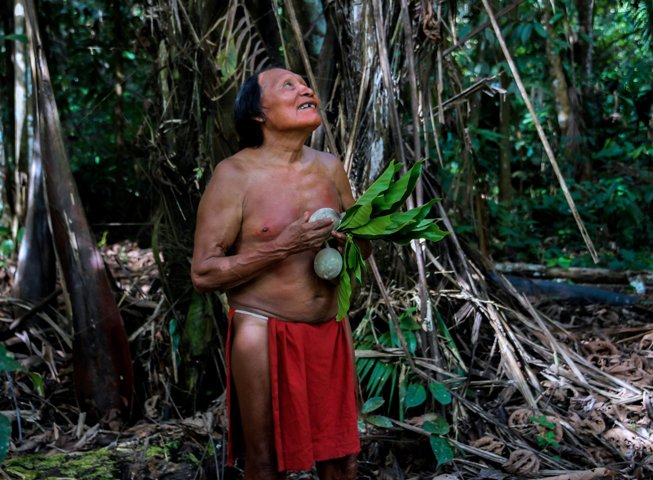Indigenous infections grew amid slow Brazil agency response

- Country:
- Brazil
As COVID-19 reached remote indigenous lands in Brazil's Amazon, the government agency responsible for protecting native people brushed off calls for action, focusing instead on waging ideological battles, according to agents from the institution itself and others. Brazilian President Jair Bolsonaro's repeated promotion of developing the vast Amazon has for months prompted indigenous activists, celebrities, and agents on the ground to sound the alarm. In the face of a spreading pandemic, they warn inaction is enough to wipe out many indigenous people.
The Associated Press spoke to four agents who work with indigenous peoples in the farthest reaches of Brazil's Amazon, and they were unanimous in their conclusion: The national Indian foundation, known as FUNAI, is hardly doing anything to coordinate a response to a crisis that could decimate ethnic groups. There's not enough protective equipment for agents who enter indigenous territories or meet with native people in cities. Necessities like kerosene and gasoline are in short supply. Food deliveries only began last week a month after indigenous people were instructed to remain in their villages and remain vastly insufficient.
Since the pandemic's onset, there has been fear about the vulnerability of native people who live far from urban health facilities and whose communal lifestyles render them susceptible to swift transmission. At least 88 indigenous people have already died of COVID-19 in the Amazon, according to a tally by the Brazilian indigenous organization APIB that includes health ministry figures and information from local leaders. The count is likely higher because hospitals often don't use patients' indigenous names when admitting them.
As native people started succumbing to the coronavirus, FUNAI's focus was elsewhere, according to Antônio Carlos Bigonha, who heads the public prosecution office responsible for indigenous affairs. He said the Indian agency's response has been “delinquent, lax, insufficient,” reflective of Bolsonaro's open support of assimilation. “The environment of COVID-19 is so grave because integration alone is bad, but in the context of a pandemic is genocide,” Bigonha said in a telephone interview.
CIMI, a Catholic group that defends indigenous rights, condemned FUNAI's policies for failing to safeguard native peoples. FUNAI fired back, attacking what it called “socialist public policies” implemented since 2003 by the leftist Workers' Party that it maintained made indigenous people dependent on welfare. “This isn't ... a socialist plot” said Bigonha. “It's just an interpretation of historical facts: We adopted integrationist policy at the start of the 20th century and it almost did away with the indigenous people.” Brazilian photographer Sebastião Salgado, famous for his work with indigenous tribes, drafted a manifesto warning of an imminent threat to native peoples and calling on Brazil's government to take action to protect them. It drew 245,000 signatories, including Paul McCartney, Meryl Streep, film director Pedro Almodóvar and model Gisele Bündchen.
FUNAI's response was swift: It returned photographs Salgado had taken of the Korubo people in the isolated Javari Valley, near the Peruvian border, along with a statement recommending Salgado auction them to buy food, personal hygiene products and cleaning goods for indigenous people. FUNAI told the AP in an e-mailed response that it adopted “all the measures within its reach" in the fight against the pandemic. It said it has distributed 45,000 food kits and more than 200,000 personal protection items nationwide, without breaking it down by region, and that another 40,000 food kits were coming soon.
Agents on the ground, including three employed by FUNAI, told a different story. They spoke to the AP on condition of anonymity for fears of retribution after several officials in the Bolsonaro administration were fired or reassigned after talking to reporters. There's no leadership from above and requests sent to FUNAI headquarters in Brasilia go unanswered for weeks, they said.
The Upper Solimoes region near Brazil's border with Colombia has one of Brazil's highest COVID-19 mortality rates. The only hospital with ventilators, a military facility in Tabatinga, on the border, has only 13 of the lung machines, the health ministry said. To contain the virus, since mid-March FUNAI agents have told indigenous groups they should prevent anyone from entering their territories and block roads and rivers near their communities.
But as long as there aren't enough food kits delivered, the tribes won't stay on their lands, the agents said. Little agriculture is possible when rivers flood the Upper Solimoes and Upper Negro regions, and the vast majority sell or trade what they fish and hunt. In the Upper Solimoes, home to some 76,000 indigenous people, only six of the 350 ethnic groups received 1,300 food kits through last week, according to an agent involved in the operation. That has further damaged FUNAI's credibility, the agent said.
(This story has not been edited by Devdiscourse staff and is auto-generated from a syndicated feed.)
ALSO READ
Colombia's ELN rebels freeze peace talks planned for April
Colombia's ELN rebels freeze peace talks planned for April
Colombia's ELN rebels freeze peace talks planned for April
Colombia's capital implements water rationing amid historic drought exacerbated by El Nino
Divisions among Colombia's EMC rebels fracture peace talks, rebel leader and government say










